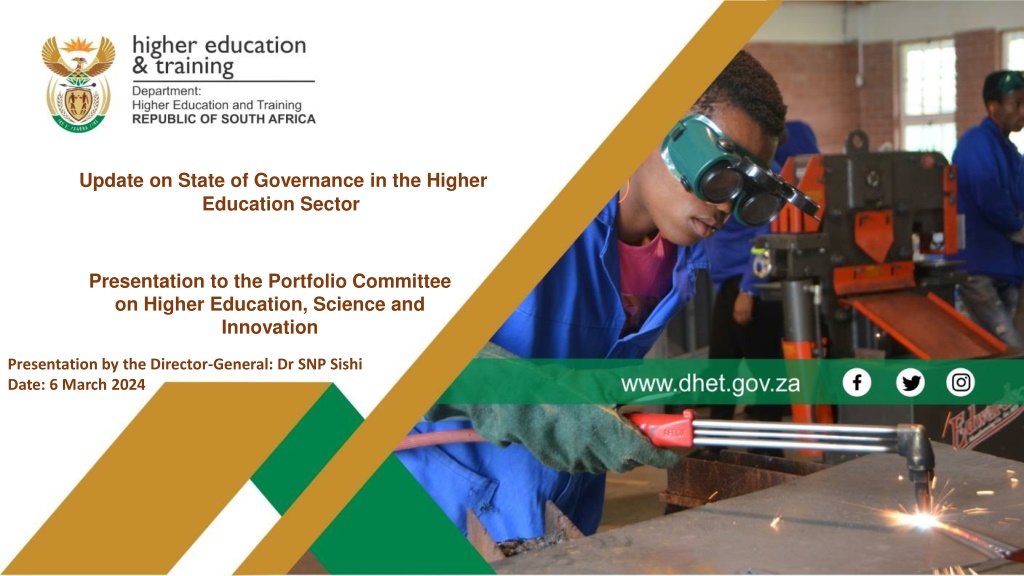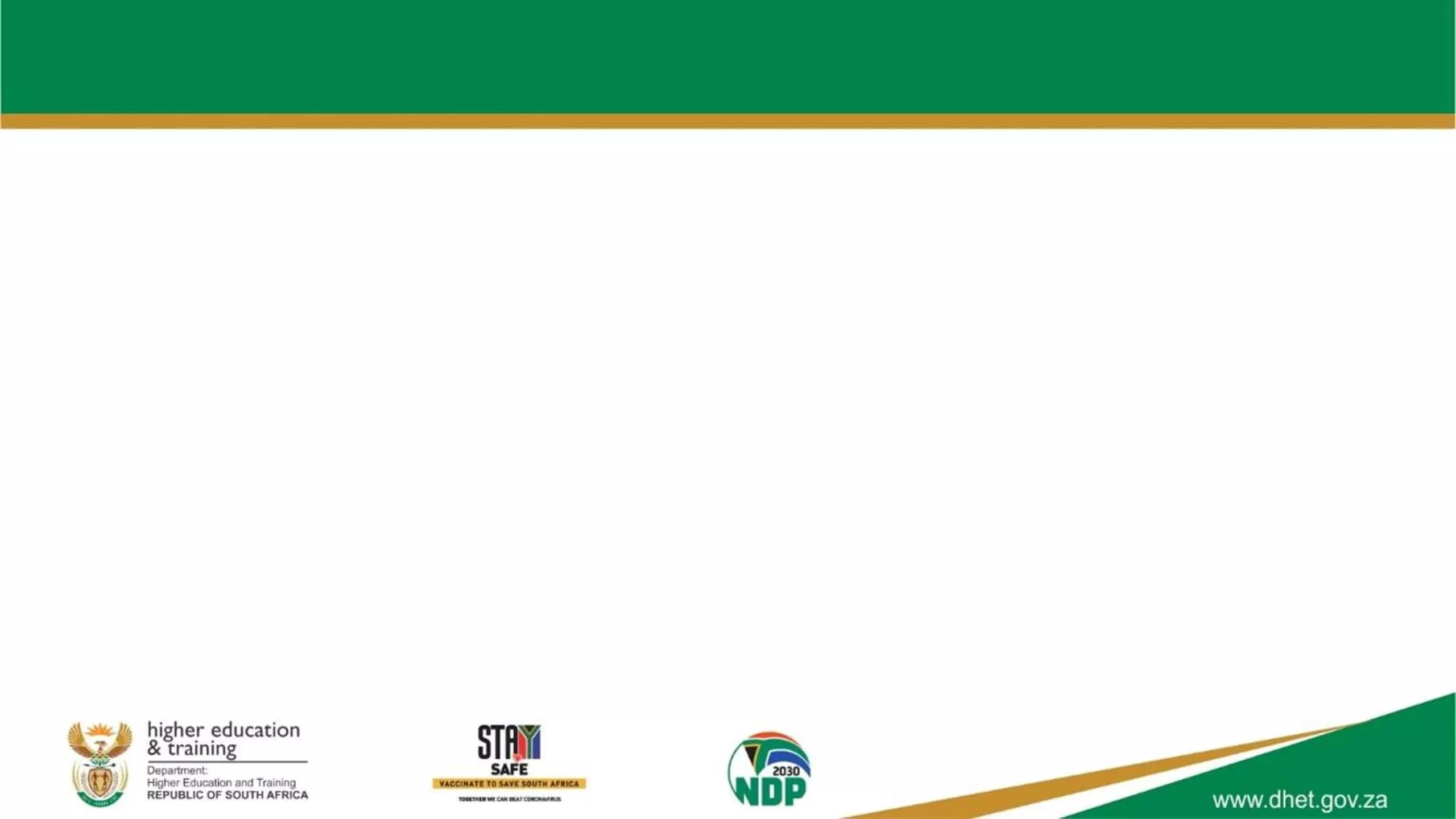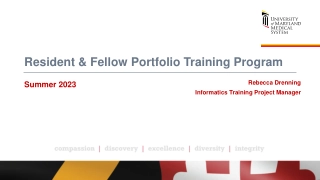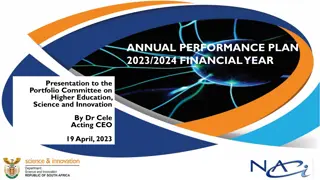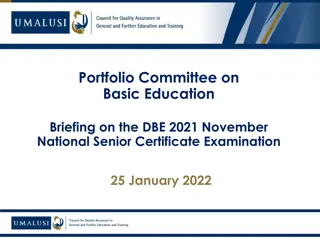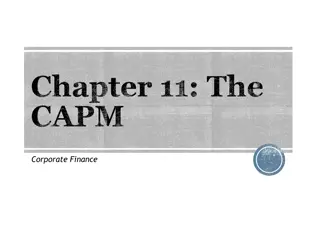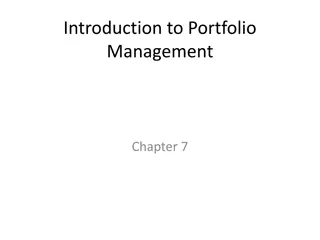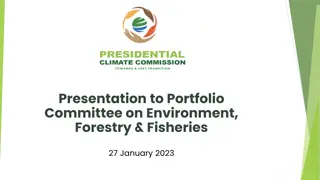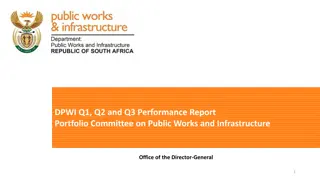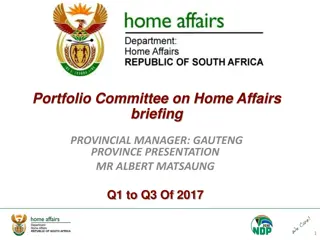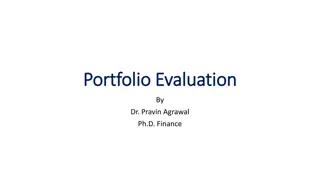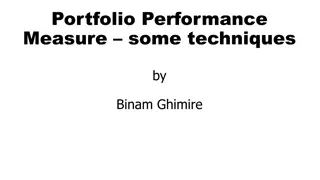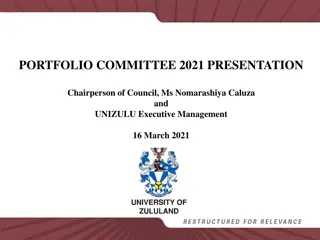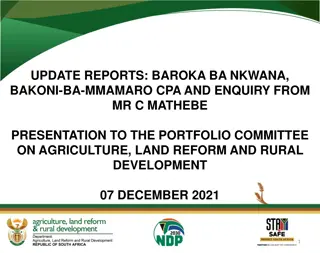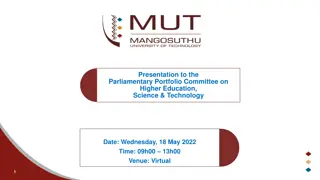Presentation to the Portfolio Committee
Overview of the state of governance in the higher education sector, including key roles, institutional statutes, and the composition of councils. Highlights include the regulations under the Higher Education Act and the publication dates of institutional statutes for various universities. Emphasis is placed on the size, composition, and responsibilities of councils in ensuring effective governance in public higher education institutions.
Download Presentation

Please find below an Image/Link to download the presentation.
The content on the website is provided AS IS for your information and personal use only. It may not be sold, licensed, or shared on other websites without obtaining consent from the author.If you encounter any issues during the download, it is possible that the publisher has removed the file from their server.
You are allowed to download the files provided on this website for personal or commercial use, subject to the condition that they are used lawfully. All files are the property of their respective owners.
The content on the website is provided AS IS for your information and personal use only. It may not be sold, licensed, or shared on other websites without obtaining consent from the author.
E N D
Presentation Transcript
Update on State of Governance in the Higher Education Sector Presentation to the Portfolio Committee on Higher Education, Science and Innovation Presentation by the Director-General: Dr SNP Sishi Date: 6 March 2024
Governance of HEIs Higher Education Act, 101 of 1997 S21 (1) The council of a public higher education institution must govern the public higher education institution, subject to this Act and the institutional statute. 2
Institutional Statutes Institution Publication Date Gazette Number Notice Number Publication Institution Publication Date Gazette Number Notice Number Publication 10 March 2023 Gazette No. 48187 Notice No. 3133 Entire Statute UFS 07 Sep 2018 Gazette No. 41887 Notice No. 927 Entire Statute UWC 17 February 2023 Gazette No. 48062 Notice No. 1611 Entire Statute DUT 16 Feb 2018 Gazette No. 41445 Notice No. 117 Entire Statute WITS 27 January 2023 Gazette No. 47926 Notice No. 2972 Entire Statute UNIVEN 18 Aug 2017 Gazette No. 41047 Notice No. 626 Entire Statute TUT 09 December 2022 Gazette No. 47665 Notice No. 2841 Entire Statute UP 07 Apr 2017 Gazette No. 40772 Notice No. 337 Entire Statute CUT 24 June 2022 Gazette No. 46705 Notice No. 2373 Entire Statute SMU 24 Mar 2017 Gazette No. 40711 Notice No. 251 Entire Statute SPU 24 June 2022 Gazette No. 46598 Notice No. 2194 Entire Statute NWU 10 Mar 2017 Gazette No. 40673 Notice No. 621 Entire Statute UL 20 May 2022 Gazette No. 46328 Notice No. 1039 Entire Statute CPUT 07 Oct 2016 Gazette No. 40334 Notice No. 1222 Amendments NMU 04 March 2022 Gazette No. 46000 Notice No. 1840 Amendment UCT 19 Aug 2016 Gazette No. 40216 Notice No. 922 Entire Statute UMP 10 Dec 2021 Gazette No. 45616 Notice No. 1582 Entire Statute MUT 17 Dec 2014 Gazette No. 38344 Notice No. 1037 Entire Statute NMU 26 Nov 2021 Gazette No. 45536 Notice No. 1528 Amendment VUT 17 Jan 2014 Gazette No. 37235 Notice No. 13 Entire Statute WSU 16 July 2021 Gazette No. 44866 Notice No. 626 Amendment UMP 07 Mar 2012 Gazette No. 35124 Notice No. 684 Amendments UKZN 12 Feb 2021 Gazette No. 44188 Notice No. 129 Entire Statute VUT 19 Feb 2007 Gazette No. 29642 Notice No. 145 Amendments 05 May 2020 Gazette No. 43288 Notice No. 506 Entire Statute UFH 14 Jul 2006 Gazette No. 29032 Notice No. 684 Entire Statute 24 Jan 2020 Gazette No. 42967 Notice No. 41 Entire Statute UCT 17 Dec 2012 Gazette No. 36006 Notice No. 1077 Amendments UNISA 19 Aug 2019 Gazette No. 42636 Notice No. 1062 Entire Statute SU 20 Jun 2008 Gazette No. 31170 Notice No. 679 Amendments 19 Jul 2019 Gazette No. 42584 Notice No. 993 Entire Statute UJ 03 Feb 2006 Gazette No. 28464 Notice No. 108 Entire Statute 19 Oct 2018 Gazette No. 41982 Notice No. 1110 Entire Statute UNIZULU 3 15 Mar 2005 Gazette No. 27390 Notice No. 477 Entire Statute RU 07 Sep 2018 Gazette No. 41887 Notice No. 927 Entire Statute UWC
Size and Composition of Councils The council must be configured to be able to carry out its responsibilities effectively. In terms of s27(4) of the Act, the council of a public HEI must consist of not more than 30 members (60% of whom must be external to the University), made up of- (a) the principal; (b) the vice-principal or vice-principals; (c) not more than five persons appointed by the Minister; (d) a member or members of the senate elected by the senate; (e) an academic employee or academic employees, elected by such employees; (f) a student or students, elected by the students' representative council; (g) an employee or employees other than academic employees, elected by such employees; and (h) such additional persons as may be determined by the institutional statute. The balance between the skills and areas of expertise and factors such as diversity, independence and regulatory requirements. 4
Size and Composition of Councils Institution Internal Members External Members (Excluding co-opted members) VC DVC EM SEN AS NAS SRC IF CONV MIN SKI DON L-GOV P-GOV COM LAB BUS FET OTH DEAN TOTAL 1 1 1 1 1 1 1 1 1 1 1 1 1 1 1 1 1 1 1 2* 2 2* 1 1 2 2 2 2 2 2 3 4 2 2 2 2 1 1 1 1 1 1 1 1 1 1 1 1 1 1 1 1 1 1 1 2 1 1 1 1 2 2 2 2 2 2 2 2 2 2 2 2 2 2 2 2 1 1 3 5 5 5 5 5 5 5 5 5 5 5 5 4 6 6 4 5 4 2 6 10 5 8 13 2 TUT UJ VUT WSU UFH CPUT SU RU UL UNIZULU SMU SPU 21 21 21 21 22 22 25 26 26 26 26 29 2 1 1 1 1 2 1 1 1 1 1 1 3 1 2 2 2 1 1 2 2 1 1 2 1 1 3* 2 1 1 2 1 2 5 9* 2 UMP 29 1 1 1 1 1 1 1 1 1 1 1 1 1 3* 2* 2* 3 1 2 1 3 4 3 2 1 3 2 2 2 2 2 3 2 2 2 3 1 1 1 1 2 1 2 2 2 1 1 2 1 1 2 2 1 2 2 2 2 1 3 2 2 2 2 2 3 2 2 2 2 4 2 1 3 2 2 4 3 2 2 4 5 5 5 5 5 5 5 5 5 5 5 5 10 10 10 12 12 3 11 10 3 6 2 1 1 2 1 1 UCT UFS CUT DUT MUT NMU NWU UKZN UNISA UNIVEN UP 30 30 30 30 30 30 30 30 30 30 30 1 1 1 3 1 1 3 3 1 1 1 2 2 2 2 1 5* 1 1 2 4 1 1 1 1 2 2 2 2 5 5 5* 7 2 2 1 1 1 2 1 2 UWC WITS 30 30 1 No specific number provided in the statute (e.g. simply states DVCs) CON: Convocation or Alumni Association; DON: Donors; MIN: Ministerial appointees; P-GOV: Provincial Government; L-GOV: Local Government; COM: Community representatives; LAB: Organised Labour; BUS: Organised business: SKI: Persons appointed on basis of skills; FET: Foundation/Entity/Trust representatives; OTH: other categories as determined by the Council. * Maximum number provided; VC: Vice-Chancellor; DVC: Deputy Vice-Chancellors or Vice-Principal; EM: Members of Executive Management other than DVCs; DEANS: Deans of Faculties; SEN: Senate; AS: Academic Staff; NAS: Non-Academic Staff; SRC: Student Representatives; IF: Institutional Forum Chairperson /member. 5
Audit Findings Nature of Finding Unqualified with no findings Institutions CPUT, UCT,DUT,UJ,UMP,UP,RU, SU,UWC and UNIZULU CUT,UFS.UKZN,UL,MUT,NWU,NMU, SMU,SPU,TUT,VUT,UNIVEN,WSU, WITS UNISA, UFH Total 10/26 Unqualified with findings 14/26 No submission 2/26 Those who received unqualified findings , all (excluding WSU), had not complied with legislation and all (excluding CUT,TUT and Univen) had no material misstatements on financial statements . 6
Governance of Higher Education Institutions During 2016/17, the Department in response to some of these challenges developed Guidelines for Good Governance Practice and Governance Indicators for Councils of South African Public Higher Education Institutions set out the principles and key elements of good governance practices to serve as a practical resource to university councils in their governance role indicators for self-assessment by university councils to measure their practices in primary areas of governance. Since 2017, Councils submit Self-assessments based on the Governance Indicators. The CHE has recommended that an independent panel should fulfil this role, the Department supports this proposal. The data being presented is the data for the 2021 academic year. 7
Self-Assessments by Councils: Strategic leadership, vision, mission, context, and transformation CUT DUT NWU SU TUT UKZN UNIZULU UP UWC 1.1 4 1. Council reviewed the institution s strategic plan, specifically in relation to the institution s annual budget, and other strategic plans such as the academic, transformation and financial plans as well as risk management and other sustainability plans. 3 2 1.5 1.2 1 0 2. Council assessed institutional policies and institutional initiatives requiring its approval; and ensured that policies are reviewed and up-to-date. 1.4 1.3 MUT SMU UFS CPUT NMU RU SPU UJ UNISA UCT WITS UFH UL UNIVEN WSU 3. Council reviewed all internal and external stakeholder relationships which fall within its purview. 1.1 1.1 4 4 3 3 4. Council ensured that appropriate steps are instituted in order to meet transformation targets. 2 2 1.5 1.2 1.5 1.2 1 1 0 0 5. Council ensured an effective distinction between strategic leadership as a system of governance and operational management. 1.4 1.3 1.4 1.3 8
Self-Assessments by Councils Governance of core functions of teaching and learning, research and community engagement CUT DUT NWU SU UCT UKZN UNISA UNIZULU UP UWC WITS 2.1 4 1. Council reviewed the enrolment plan to ensure alignment to the strategic plan and national objectives with the knowledge that Senate has scrutinised the academic requirements of the PQM. 3 2 2.5 2.2 1 0 2. Council assessed the institution s enrolments, throughput and graduation rates in line with strategic targets set for these. 2.4 2.3 3. Council reviewed the institution s research and innovation endeavours and outputs against strategically set targets. CPUT NMU RU SPU MUT SMU TUT UFS UJ UFH UL UNIVEN WSU 2.1 4 2.1 4 3 3 4. Council reviewed the institution s community engagement endeavours against strategically set targets. 2 2 2.5 2.2 1 2.5 2.2 1 0 0 5. Council received and considered reports from senate on the core functions of the institution. 9 2.4 2.3 2.4 2.3
Self-Assessments by Councils CUT UJ MUT UKZN NWU UNISA SMU UNIZULU SU UP TUT UWC UFS WITS Governance of resources: Financial, human, equipment and infrastructure 3.1 4 1. Council approved the institution s budget, especially in relation to the institution s strategic plan, and regularly reviewed the institution s income and expenditure against the budget. 3 3.7 3.2 2 1 2. Council received and considered reports from internal audit and engaged with the external auditors. 0 3.6 3.3 3. Council approved the institution s annual financial statements and took appropriate steps in the case of qualified external audit opinions. 3.5 3.4 4. Council ensured that the institution s information and technology (IT) governance systems and policies align to and contribute effectively to the institution s strategic objectives. CPUT NMU RU SPU DUT UCT UFH UL UNIVEN WSU 3.1 4 3.1 4 5. Council has in place legally sound and fair appointment policies for all staff and in particular for the vice-chancellor and members of senior management; and ensured compliance thereof. 3 3.7 3.2 3 3.7 3.2 2 2 1 1 6. Council reviewed and approved all building and infrastructure projects as well as procurement of services in terms of its decision-making delegations; and played the necessary oversight over the implementation of the projects. 0 0 3.6 3.3 3.6 3.3 7. Council has in place working whistle blowing services and received regular reports on alleged fraudulent and corrupt activities in the University; and ensured that appropriate action was taken. 3.5 3.4 3.5 3.4 10
Self-Assessments by Councils Governance of institutional accountability including public reporting CUT UJ DUT UKZN NWU UNISA SU UNIZULU TUT UP UCT WITS UFS 4.1 4 1. Council received and considered institutional reports from the vice-chancellor; and was satisfied with the quality thereof. 3 2 4.5 4.2 1 2. Council reviewed the performance of the vice-chancellor in terms of a performance agreement between itself and the vice-chancellor and took corrective steps where needed. 0 4.4 4.3 3. Council considered and approved the institution s annual performance plan and the accompanying performance report for DHET and ensured its timeous submission to DHET. CPUT NMU RU SPU MUT SMU UWC UFH UL UNIVEN WSU 4.1 4.1 4 4. Council ensures that Council-nominated members of the senate and the institutional forum participated constructively and satisfactorily in meetings. 4 3 3 2 2 4.5 4.2 1 4.5 4.2 1 5. Council ensured that institutional stakeholders were included and participated in the governance of the institution where relevant and necessary, so as to ensure all interests were adequately represented. 0 0 4.4 4.3 4.4 4.3 11
Self-Assessments by Councils CUT NWU SMU UFS UJ UKZN UNIZULU UP UWC WITS Council meetings and conduct of business 5.1 4 1. Council has in place and ensured adherence to the following good governance instruments: A set of institutional rules covering provisions within the institutional statute in greater detail; a code of conduct; conflict of interest declaration procedures; and a comprehensive decision-making delegations framework. 3 2 1 0 5.8 5.2 5.7 5.3 2. Council ensured that its new members were appropriately inducted. 3. Council has ensured that the institutional statute and/or institutional rules include membership criteria for members of council and its committees and that these were applied rigorously. 5.6 5.4 5.5 4. Council ensured that all committees operate in terms of council approved charters and took the necessary remedial steps in cases where this proved to be not so. CPUT UFH NMU UL RU UNIVEN SPU WSU DUT SU MUT TUT UCT UNISA 5.1 5.1 5. Council agendas and supporting documentation in an appropriate format were delivered within the stipulated period with no or a minimum of supplementary agendas permitted. 4 4 5.8 5.2 3 3 5.8 5.2 2 2 6. Council and specifically the chairperson and the registrar ensured that accepted meeting procedures were adhered to strictly. 1 1 5.7 5.3 0 5.7 5.3 0 7. Council considered the advice of the institutional forum on transformation and institutional culture imperatives and provided written reasons if the advice was not accepted. 5.6 5.4 5.6 5.4 12 8. Council has in place a mechanism to inform the University community of its activities in the interest of transparency. 5.5 5.5
Overview of current state of affairs (1) University Type Number of Universities Under Administration Independent assessment / Post-administration state Concerns Traditional NWU, RU, SU, UCT, UFH, UFS, UKZN, UL, UP, UWC, WITS 11 - 1 (UFH) UFH UoTs CPUT, CUT DUT, MUT, TUT, VUT 6 1 (MUT) 2 (CUT, VUT) VUT, MUT Comprehensive NMU, SMU, SPU, UJ, UMP, UNISA, UNIVEN, UNIZULU, WSU 9 - 1 (UNISA) UNISA 14
Overview of current state of affairs (2) Institution MUT University under administration from Oct 2022 (Professor Lourens Van Staden as Administrator) Administrator submitted the 2nd progress report in Aug 2023 The 3rd progress report is due. University was under administration from Aug 2019 to Aug 2021. Administrator submitted his close-out report to the Minister on 16 August 2021. There have been challenges in the University Council, first the Chairperson resigned, and her resignation was followed by 2 other resignations, the Deputy Chairperson and the Chair of the Audit and Risk Committee, and the Registrar has been suspended. The matter is being investigated. Following the passing of the former VC, Prof Khehla Ndlovu has been appointed as VC. The VC was accused of nepotism and after Council conducted an investigation led by a retired judge, he subsequently withdrew his nephew s placement and was requested to make his apology public. VUT SU 15
Overview of current state of affairs (3) UFH entered its post-administration phase in November 2020 following an 18- months period of governance administration from April 2019. A new Council was constituted under the leadership of Bishop I Abrahams and Dr Siphokazi Koyana, as Chairperson and Deputy Chairperson, respectively. The close-out reports of the two Administrators (Prof Loyiso Nongxa and Mr Nhlanganiso Dladla) were submitted on 29 June 2020 and 13 May 2021, respectively. As part of the post-administration arrangements, the Minister, issued a directive to the Council, that the University must report to the Minister biannually through the Mid-term and annual report, on the implementation of the CTPIP and other measures, which arise from the findings of the Independent Assessor. The University has been compliant with the directive. There has been safety concerns stemming from reports of murders, assassination attempts and attacks, the latest being the assassination attempt against the VC that took the life of his bodyguard in January 2023. There has also been the SIU investigation into the allegations relating to the16 UFH
Overview of current state of affairs (4) There has also been the SIU investigation into the allegations relating to the maladministration in the Faculty of Public Administration under the proclamation R.84 of 2022, as published in the GG No 47199 of 5 August 2022. The Minister visited the University in June 2023 to meet with the Council regarding a number of concerns raised by the University stakeholders. Prof Ntsebenza has been elected as the new Chair of Council following the sudden resignation of the former Chair, Bishop Abrahams in March 2023. 3 Members of Council have been suspended and they have since decided to contest the decision of a council meeting they allege was not quorate. The Minister hopes to engage the SIU before further decisions are made. UFH A whistleblower reported that the Council is seeking to extend the second term of the VC, thereby contravening their own statute. The matter is being investigated. UMP 17
Overview of current state of affairs (5) Institution UNISA The Minister appointed an Independent Assessor in September 2022 The Minister shared the copy of the IA Report with the Council of the University on Friday 12 May 2023, the was published in the Government Gazette on 26 May 2023. During this period, few members of Council resigned, and the Registrar was fired. The Council response was received on 9 June 2023. The Minister issued a Notice to dissolve the UNISA Council. The University made a Court application to review and set aside the Report of the IA. The Department is continuing to engage its legal team. The Minister appointed an Independent Assessor in October 2022 The IA recommended the dissolution of Council and appointment of an Administrator. The Minister provided the copy of the Report to the CUT Council on 23 May 2023, and published it by Notice No. 696 in the Government Gazette 48696 of 2 June 2023. The Council responded to the Report on 22 June 2023. Further actions are being considered given the positive response by the Council to the listed corrective measures. CUT 18
Overview of current state of affairs (6) Institution UCT The problems at UCT emerged following the departure of former Deputy Vice-Chancellor (DVC): Teaching and Learning, Associate Professor Lis Lange in April 2022. In October 2022, the University Council appointed a Panel to investigate, among others, all matters related to executive relationships, including the number of, and reasons for resignations of staff within and outside the executive. On 21 February 2023, Council approved the Settlement Agreement to terminate the then VC, Professor Phakeng s employment on 3 March 2023. Her departure led to the amendment of the ToRs of the Independent Panel. The Panel was set to complete its work by 14 July 2023 but has requested a further extension until mid-October, although it undertook to submit the final Report by 30 September 2023. On 8 November 2023, the Portfolio Committee conducted an institutional visit to UCT to engage on the Independent Panel Report. The Council has proceeded to implement the recommendations of the Independent Panel. The Department is considering further engagements on transformation at the university. 19
Overview of the University Leadership Chairperson of Council Chancellor Vice-Chancellor Registrar Dr Laurine Platzky Minister Thandi Modise Prof Chris Nhlapo Mr Sello Mokoena CPUT Dr Charity Mbileni-Morema Dr Vincent Maphai Prof Pamela Dube Dr Sally Dzingwa CUT (Interim) Mr Wiseman Madinane Ms Nonkululeko Nyembezi Prof Thandwa Mthembu Dr Maditsane Nkonoane DUT Prof Lourens Van Staden Mr Sandile Donald Zungu Prof Marcus Ramogale (Acting) Dr Phumzile Masala MUT (Administrator) Ms Nozipho January-Bardilll Dr Geraldine Fraser-Moleketi Prof Sibongile Muthwa Mr Edgar D Koker NMU Mr Albert Sorgdrager Dr Anna Mokgokong Dr Bismark Tyobeka Prof Marlene Verhoef NWU Judge Gerald Bloem Judge Lex Mpati Dr Sizwe Mabizela Dr Adele Moodly RU Ms Maria M Rambauli Dr Zweli Mkhize Prof Peter Mbati Dr Jeffrey Mabelebele SMU Judge Violet Phatshoane Judge Stevan Majiedt Prof Andrew Crouch Dr Jody Cedras SPU Dr Nicky Newton-King Dr Johann Rupert Prof Wim de Villiers Dr Ronel Retief SU Mr Ivan Ka-Mbonane Dr Gwen Ramokgopa Prof Tinyiko Maluleke Dr Michael Mushaathoni TUT Mr Norman Arendse Dr Precious Moloi-Motsepe Prof Daya Reddy (Interim VC) Mr Royston Pillay UCT 20 Prof Lungisile Ntsebeza Adv Dumisa Ntsebeza Prof Sakhela Buhlungu Mr Njabulo Zuma UFH
Overview of the University Leadership Chairperson of Council Chancellor Vice-Chancellor Registrar Mr David Noko Prof Bonang Mohale Prof Francis W Peterson Mr Nikiwe Ntsababa UFS Ms Xoliswa Kakana Dr Phumzile Mhlambo-Ngcuka Prof Letlhokwa Mpedi Prof Kinta Burger UJ Dr Letitia Moja Former CJ Mogoeng Mogoeng Prof Nana Poku Dr Kathy Cleland UKZN Mr Pandelani Nefolovhodwe Dr Nkosazana Dlamini Zuma Prof Nehemiah Mokgalong Prof Kwena Masha UL Mr Sabelo Mahlelela Justice Mandisa Maya Prof Thokozile Mayekiso Mr Sello Legodi UMP Mr James Maboa Mr Thabo Mbeki Prof Puleng LenkaBula Prof Moloko Sepota (Acting) UNISA Mr Juneas Lekgetha Adv Mojankunyane Gumbi Dr Bernard Nthambeleni Adv Edward Lambani UNIVEN Ms Nomarashiya Caluza Chief Justice Raymond Zondo Prof Xoliswa Mtose Mr Deochund Mothilall UNIZULU Mr Kusela Dlamini Emeritus Justice Sisi Khampepe Prof Themba Mosia (Acting) Prof Caroline Nicholson UP Judge Nathan Erasmus Archbishop Thabo Makgoba Prof Tyrone Pretorius Dr Nita Lawton-Misra UWC Mr S mangaliso Vilakazi Prof Mandla Radebe Dr Xolani Mkhwanazi Prof Khehla Ndlovu (new) VUT (Acting) Mr Isaac Shongwe Dr Judy Dlamini Prof Zeblon Vilakazi Ms Carol Crosley WITS 21 Adv Tembeka Ngcukaitobi Ms Nonkululeko Gobodo Prof Rushiella Songca Dr Lulamile Ntonzima WSU
Way Forward Sectorial Matters The Minister met with Council Chairs to discuss the CHE Report and Phase 1 of the Comprehensive Student Funding model and agreed to have further engagements on sectoral issues. It is necessary to review how council members are reviewed, the methods used thus far have not provided early warning signs to enable the Minister to engage proactively with governance challenges. The review of the Higher Education Act is urgent and necessary to ensure effective monitoring and evaluation in the sector. 22
Update on State of Governance in TVET Colleges 23
Background The fifty Technical and Vocational Education and Training colleges (colleges) in South Africa which are fully funded by the state are governed by the Continuing Education and Training Act, 16 of 2006 as amended ( CET Act). Governance at TVET colleges, although young compared to universities, is steadily entering the phase of consolidation and institutionalisation. The current council in the forty-seven colleges are completing their five- year term of office and will have new councils for the next cycle of five years 2024- 2029. Three colleges, that is Tshwane south, Central Johannesburg and Coastal TVET Colleges had a new council in place last year. 24
Governance functions Governance councils in all the fifty colleges have been fully functioning with the main council committees in place, i.e. Audit and Risk, Finance, HR and Planning committees. Some colleges had instituted additional committees as required by their need. All councils have been holding quarterly meetings. The Department have been supporting both the management and council of colleges and had ensured that all councils participate in the development of the strategic planning process, and review of relevant policies. This practice is now a culture, and all college compliance reports are reviewed and approved by the council. All councils are getting involved in the oversight over audit and risk, finance and the academic board. The level of involvement of councils varies from one college to another depending on the current capacities in the college management and council. The Department, through the quarterly capacity building programme is creating spaces for the council and management to share practices. 25
Governance concerns Currently there is no college under administration. This reflects the steadily maturing culture of governance and management at TVET colleges. In addition, the Department is responding to issues with appropriate support and intervention in time to manage them. As in every governance exercises over management, TVET colleges have their fair share of natural tension in the relationship between the council and management. The level of tension is steadily improving with experienced gained by both the council and management. Both Central Johannesburg and Coastal TVET Colleges which have been under administration and struggling over the last few years are at an early stage of stabilization and are functioning properly with a new council in place. There is still a lot work required to fully stabilise these two colleges and would requires institutional support from the Department. The forensic investigation conducted at Buffalo City TVET College has been completed and is awaiting a final report from the independent forensic investigator. Thekwini TVET College which has been struggling due to the poor relationships between some senior members of the council and the principal will appoint a new council. The Department will closely follow and support the new council and management with regard to relationship management. 26
Appointment of New Council The term of office of forty-seven colleges is coming to an end early this year. The term of office of some came to an end at the end of last year and the beginning of this year. COLLEGE (REGIONS) DATE OF APPOINTMENT DATE OF TERMINATION EASTERN CAPE Buffalo City Eastcape Midlands Ikhala Ingwe King Hintsa 09-Nov-18 09-Nov-18 09-Nov-18 09-Nov-18 30-Jan-19 09-Nov-23 09-Nov-23 09-Nov-23 09-Nov-23 30-Jan-24 King Sabata Dalindyebo Lovedale 12-Mar-19 09-Nov-18 12-Mar-24 09-Nov-23 Port Elizabeth 09-Nov-18 09-Nov-23 27
End of Term of Office FREESTATE Flavius Mareka TVET College Goldfields TVET College Maluti TVET College Motheo TVET College 09-Nov-18 09-Nov-18 09-Nov-18 09-Nov-18 09-Nov-23 09-Nov-23 09-Nov-23 09-Nov-23 GAUTENG Central Johannesburg TVET College Ekurhuleni East TVET College Ekurhuleni West TVET College Sedibeng TVET College Feb 2024 10-Apr-19 10-Apr-19 10-Apr-19 Mar 2024 10-Apr-24 10-Apr-24 10-Apr-24 South West Gauteng TVET College Tshwane North TVET College Tshwane South TVET College Western TVET College 27-Mar-19 10-Apr-19 12-May-22 10-Apr-19 27-Mar-24 10-Apr-24 12-May-27 10-Apr-24 28
Contin...End of Term of Office KWAZULU-NATAL Coastal TVET College Elangeni TVET College Esayidi TVET College Majuba TVET College Mnambithi TVET College Mthashana TVET College Thekwini TVET College Umfolozi TVET College Umgungundlovu TVET 06-Oct-22 09-Nov-18 09-Nov-18 11-Mar-19 11-Mar-19 09-Nov-18 09-Nov-18 09-Nov-18 06-Oct-27 09-Nov-23 09-Nov-23 11-Mar-24 11-Mar-24 09-Nov-23 09-Nov-23 09-Nov-23 LIMPOPO College Capricorn TVET College Lephalale TVET College Letaba TVET College Mopani East TVET College Sekhukhune TVET College Vhembe TVET College Waterberg TVET College 09-Nov-18 09-Nov-18 30-Jan-19 09-Nov-23 09-Nov-23 30-Jan-24 09-Nov-18 09-Nov-18 09-Nov-18 09-Nov-18 09-Nov-23 09-Nov-23 09-Nov-23 09-Nov-23 29
Processes of Appointing Council In terms of Section 10(4)(b) of the Continuing Education and Training (CET) Act, no 16 of 2006 (as amended), the council of a public Technical and Vocational Education and Training (TVET) college is constituted by, amongst others, five (5) external members of a college council appointed by the Minister. In addition, in terms of Section 10(6) of the Act council must, in consultation with the Minister, appoint four (4) additional persons with inter alia Financial, Human Resources and Legal skills, as members of the Council. In terms of Item 40 of the schedule of the Act, an elected donor member on the council must be recognised and registered in the register of donors kept at the college. The chief accounting officer, the principal is a member of the council. The remaining five internal council members are elected by their respective constituencies. A fully constituted Council is composed of sixteen (16) members which consists of the following persons: (i) The principal; (ii) Five (5) external members appointed by the Minister [section 10(4)(b)]; (iii) One (1) member of the academic board elected by the academic board; (iv) One (1) lecturer elected by the lecturers at the college; (v) Two (2) students elected by the Student Representative Council (SRC); (vi) One (1) member of support staff elected by the support staff of the college; (vii) One (1) external member representing donors [section 10(4)(d)]; and Four (4) members contemplated in section 10(6) of the Act with a broad spectrum of competencies in the fields of education, business, (viii) finance, law, marketing, information technology and human resource management appointed by the council in consultation with the Minister. 30
The Appointment of Ministerial Council Members Section 10(10)(a) of the CET Act prescribes that, the Minister must by notice in a government gazette or by any other reasonably practicable means, invite nominations for the appointment of the members contemplated in section 10(4)(b). In summary, the process of appointing council members in terms of section 10(4)(b) entails: (i) Publication of a call for nominations of members of councils at TVET colleges in a government gazette and national print media. (ii) Conducting a screening process on all nominations received. (iii) Recommending suitable candidates to the Minister for appointment through a ministerial submission. All these processes have been completed and the submission to appoint the Ministerial appointee is being considered by the Minister and is expected to be finalised in early March 2024. The appointment of the additional and internal members will be processed by the Ministerial appointees and the principals. 31
Appointment of Additional External and Internal Members In terms of section 10(6) of the CET Act the appointment of the four additional members is conducted by the newly appointed Ministerial appointee in cooperation with the principal of the college. Once appointments are made it is submitted to the Minister for his approval. The chief accounting officer, the principal is an ex officio member of the council and remaining five internal members are appointed by their respective constituencies. 32
Appointment of New Council MPUMALANGA Ehlanzeni TVET College Gert Sibande TVET College Nkangala TVET College 27-Mar-19 27-Mar-19 27-Mar-19 27-Mar-24 27-Mar-24 27-Mar-24 NORTH WEST Orbit TVET College Taletso TVET College Vuselela TVET College 16-Apr-19 16-Apr-19 27-Mar-19 16-Apr-24 16-Apr-24 27-Mar-24 NORTHERN CAPE Northern Cape Rural TVET College Northern Cape Urban TVET College 16-Apr-19 16-Apr-24 16-Apr-19 16-Apr-24 WESTERN CAPE Boland TVET College College of Cape Town for TVET False Bay TVET College Northlink TVET College South Cape TVET College West Coast TVET College 27-Mar-19 27-Mar-19 27-Mar-19 27-Mar-19 27-Mar-19 27-Mar-19 27-Mar-24 27-Mar-24 27-Mar-24 27-Mar-24 27-Mar-24 27-Mar-24 33
Induction of New Council Members The Department will induct the new Ministerial appointee as soon as their appointment is finalised. An initial two-day induction will be provided to all the Ministerial appointee ( section 10(4(b)) and all will be provided with an TVET College Council Induction Manual and a copy of the CET Act. In addition, the Department will conduct six regional two-day induction workshops for all the fully constituted council members (16 in each college). These induction are expected to happen between March and May 2024. 34
Research partnerships with universities As part of the evaluation of governance at TVET colleges the Department has partnered with the University of Western Cape to conduct research into the Governance of TVET colleges. The research is underway, and the research report is expected to be finalised in March 2024. This is the first of its kind and is expected to provide more specific data and insight into the working of councils. The outcome of the research report will be used to focus the institutional support provided by the Department on areas that require priority intervention. 35
Update on Governance and Management at Community Education and Training Colleges 36
GOVERNANCE AND MANAGEMENT The stability and success of operations at Community Colleges is dependent on their governance and management. Governance: All 9 Community Colleges have functional councils in terms of the Continuing Education and Training Act, Act No 16 of 2006. Their term of office ends in October 2025 except for the Northern Cape which ends in 2026. Training interventions have been conducted since their appointments and the last capacity building workshop held on 27 and 28 November 2023. There are five college councils vacancies for Ministerial Appointees : Northern Cape, 1 X Limpopo and 1 X Eastern Cape. All except Eastern Cape (new vacancy) have been advertised. 1 X Free State, 2 X Mpumalanga, 1 x Management: Out of the 9 Community Colleges, Limpopo and Gauteng Community Colleges have vacancies for the principals post. There are acting incumbents in place. Eastern Cape Community College principal has resigned with effect from 31 May 2024. For Limpopo, Community College the post has been advertised.
GOVERNANCE AND MANAGEMENT Deputy Principals (DP) In terms of the structure, Community Colleges have 3 DPs - Academic, Finance and Corporate Services. All colleges have full DPs except for the Western Cape due to recent resignations of DP Finance and Academic. Colleges operate on a skeletal HR capacity. The absence of an approved organogram and lack of funding remain a challenge for CET Colleges. Centre Managers The role of CM is important particularly to the core business of community colleges ~ teaching and learning. There are no permanently appointed centre managers, mainly due to the migration process and standardisation. Prior to migration all personnel heading centres regardless of size (e.g. satellite centres) were considered centre managers. The Minister gazetted 200 Community Learning Centres (CLC) and 1,591 Satellite Centres; currently CLCs are managed by Acting Centre Managers. The Minister also approved the establishment and filling of the 200 Centre Managers posts in line with the reconfigured institutional landscape. Due to limited funding, the Branch is unable to fill the centre managers posts. 90 Centre Managers will be trained by the National School of Government by end of March 2024 across three Provinces.
Overall performance of the Sector Education and Training Authorities (SETAs) during the 6th Administration, 2019/20 2022/23
OUTLINE OF THE PRESENTATION Background; Medium-Term Strategic Framework Outcomes; Economic Reconstruction and Recovery Plan; Sector Skills Plans; National Skills Development Plan; Sector Education and Training Authorities and Levy System; Critical Expenditure: Administration, Mandatory and Discretionary Grant; Sector Education and Training Authorities support of Artisan Development; Sector Education and Training Authorities support of Centres of Specialisation; Sector Education and Training Authorities support of Learning Programs; Audit Outcomes of the Sector Education and Training Authorities; and Audit Outcomes and Action Plans of the SETAs for the period ended 31 March 2024. Annexure A: Scope of SETAs and Ten Top Occupations Identified for 2023/24
BACKGROUND Sector Education and Training Authorities ( SETAs ) are established in terms of Section 9 of the Skills Development Act (Act No. 97 of 1998) ( SDA ). There are currently 21 SETAs within the levy grant system. The Minister finalized the National Skills Development Plan ( NSDP ) as published on 7 March 2019, for implementation for the period 1 April 2020 to 31 March 2030, closely aligned with the National Development Plan ( NDP ) and subsequently reestablished the SETAs for the period up to 31 March 2030; SETAs are required to implement Sector Skills Plans ( SSPs ) by facilitating the delivery of improved industries sector-specific skills to contribute to the goals of the National Skills Development Strategy ( NSDS ). They are expected to ensure that intermediate and high- level skills are developed among both workers as well as unemployed persons; and Critical to the work of the SETAs is the support of workplace-based learning programs: Learnerships, Apprenticeships, Internships, and Skills Programs. SETAs perform their functions as prescribed by the SDA, the Skills Development Levies Act (Act 9 of 1999) ( Levies Act ), the Public Finance Management Act (Act No.1 of 1999) ( PFMA ), and their respective Constitutions as prescribed by the SETA Standard Regulations.
STRATEGIC FIVE-YEAR OUTCOMES Expanded access to PSET opportunities To provide a diverse student population with access to a comprehensive and multifaceted range of PSET opportunities. Improved efficiency and success of the PSET system To improve efficacy and success of the PSET system. Improved quality of PSET provision To build the capacity of PSET institutions to provide quality education and training. A responsive PSET system To provide qualifications programmes and curricula that are responsive to the needs of the world of work, society and students. Excellent business operations within DHET To ensure sound service delivery management and effective resource management within the department.
ECONOMIC RECONSTRUCTION AND RECOVERY PLAN PRIORITY SECTORS 1. Infrastructure investment and delivery 8. Mass public employment (including the PYEI) 8 ERRP PRIORITY SECTORS 7. Support for the recovery and growth of the tourism, creative and cultural industries 2. Localisation through industrialisation 3. Digital economy and innovation 6. Green economy interventions 5. Agriculture and food security 4. Energy security 43
SECTOR EDUCATION AND TRAINING AUTHORITIES SECTOR SKILLS PLAN FRAMEWORK In terms of Section 10 of the SDA, SETAs must develop SSPs, with the National Skills Development Strategy. The SSPs are structured into six chapters. Each chapter leads logically to the other. Chapter 2 Chapter 3 Chapter 1 Chapter 4 Chapter 6 Chapter 5 SETA Occupational Shortages and Skills Gaps Key Skills Change Drivers Strategic Skills Priority Actions Sector Partnerships Sector Profile Monitoring and Evaluation Extent and nature of skills demand; Extent and nature of skills supply; Sectoral Priority; Occupations and interventions. Scope of Coverage; Key Role- Players; Economic Performance; Employer Profile; and Labour Market Profile. Sector Skills Planning Reflections and Plan of Action Change Drivers; Alignment with National; Strategies and Plans. Existing Partnerships and Planned Partnerships Findings from Previous Chapters and Recommended Actions 4 4
Identify and increase production of occupations in demand 1 DHET Priority Skills 2 Linking education and workplace Improving the level of skills in the South African workforce 3 Increase access to occupationally directed programmes 4 Support the growth of the public college system 5 Skills development support for entrepreneurship and cooperative development 6 Encourage and support worker initiated training 7 NSDP 8 Outcomes Support career development services 8 45
SECTOR EDUCATION AND TRAINING AUTHORITIES AND LEVY SYSTEM Skills Development Levy ----- 1% All employers whose gross wage bill exceeds R 500 000 per annum should be paying 1% Skills Development Levies. 80% SETAs 20% NSF 1. Agriculture (AgriSETA); Sector Education and Training Authority 1. Health and Welfare Education and Training Authority (HWSETA); 2. Insurance Sector Education and Training Authority (INSETA); 2. Banking (BankSETA); Sector Education and Training Authority 3. Local (LGSETA); Government Sector Education and Training Authority 3. Culture, Arts, Tourism, Hospitality and Sport Education and Training Authority (CATHSSETA); 4. Manufacturing, Engineering and Related Services Sector Education and Training Authority (merSETA); 4. Construction Education and Training Authority (CETA); 5. Media, Advertising, Information and Communication Sector Education and Training Authority (MICT SETA); 5. Chemical Authority (CHIETA); Industries Sector Education and Training 6. Mining Qualifications Authority (MQA); 6. Education, Training and Development Practices Education and Training Authority (ETDPSETA); 7. Public Service Sector Education and Training Authority (PSETA); 8. Safety (SASSETA); and Security Sector Education and Training Authority 7. Energy and Water Sector Education and Training Authority (EWSETA); 9. Services Sector Education and Training Authority (SERVICES SETA); 8. Financial and Accounting Services Sector Education and Training Authority (FASSET); 10. Transport Education and Training Authority (TETA); and 9. Food Education and Training Authority (FOODBEV); and Beverages Manufacturing Industry Sector 11. Wholesale and Retail Sector Education and Training Authority (W&R SETA) 10. Fibre Processing and Manufacturing Sector Education and Training Authority (FP&M SETA); 4 6
CRITICAL EXPENDITURE : ADMINISTRATION, MANDATORY GRANT AND DISCRETIONARY Expenditure in the following critical items Administration; Mandatory Grant and Discretionary Grant for the period 2019/20 2022/23. ENE 2019/20 TO 2022/23 2019/20 2020/21 2021/22 2022/23 ADMINISTRATION 2 051 081 2 106 535 2 587 539 2 628 700 MANDATORY 2 886 167 1 462 482 2 184 285 2 380 915 DISCRETIONERY 10 974 594 8 975 315 10 163 120 11 938 923 TOTAL EXPENDITURE 15 911 842 12 544 332 14 934 944 16 948 538
ARTISAN DEVELOPMENT SUPPORTED BY THE SECTOR EDUCATION AND TRAINING AUTHORITIES The number of learners entering artisanal trades from 2019/20 2021/22. SETA 2019/20 2020/21 2021/22 396 1 112 1 812 2 543 672 141 270 237 3 056 564 194 1 889 1 148 467 191 267 136 1 849 785 262 2 191 1 770 724 AGRISETA CATHSSETA CETA CHIETA EWSETA 76 FOODBEV 160 91 2 895 FP&M SETA HWSETA INDLELA 44 59 - LGSETA 1 524 1 847 997 1 644 1 619 2 160 MERSETA MQA 60 80 117 448 130 122 - PSETA 165 1 031 682 626 16 218 128 645 157 716 SASSETA SERVICES TETA W&RSETA 10 302 14 379 TOTAL
ARTISAN DEVELOPMENT SUPPORTED BY THE SECTOR EDUCATION AND TRAINING AUTHORITIES The number of learners completing artisanal trades from 2019/20 2021/22. SETA AGRISETA CATHSSETA CETA CHIETA EWSETA FOODBEV FP&M SETA HWSETA INDLELA LGSETA MERSETA MQA PSETA SASSETA SERVICES TETA W&RSETA TOTAL 2019/20 2020/21 2021/22 280 56 1 824 1 980 3 085 119 493 214 3 087 549 6 411 2 465 271 264 44 2 741 1 633 2 582 104 369 151 1 888 309 4 895 1 734 - 1 446 1 389 1 631 113 471 271 965 263 4 008 2 262 11 33 114 10 88 294 1 719 1 463 1 093 770 1 740 984 - 6 - 24 050 15 106 19 536
SECTOR EDUCATION AND TRAINING AUTHORITIES SUPPORTING CENTRES OF SPECIALISATION Sector Education and Training Authorities Supporting Centres of Specialisation. FUNDING SETA QUALIFICATION PARTICIPATING COLLEGES Occupational Certificate: Bricklayer Vuselela TVET College Northern Cape Urban TVET College CETA; AGRISETA; W&RSETA; SASSETA South Cape TVET College Flavius Mareka TVET College False Bay TVET College Sekhukhune TVET College Motheo TVET College Orbit TVET College Tshwane South TVET College Northlink TVET College Gert Sibande TVET College Umfolozi TVET College Tshwane South TVET College Gert Sibande TVET College Majuba TVET College Northlink TVET College Occupational Certificate: Electrician PSETA; merSETA. EWSETA Occupational Certificate: Millwright AGRISETA, FOODBEV SERVICES; FPMSETA
